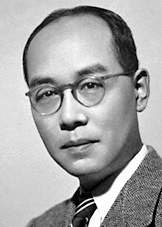Hideki Yukawa was born in 1907 in Tokyo, the third son of Takuji Ogawa a professor of geology at Kyoto Imperial University (now Kyoto University). He obtained his MS degree from Kyoto University in 1929 and DSc (equivalent to S3) from Osaka University in 1938.
Between 1932 and 1938, he followed his father's footsteps as teachers in Kyoto University and in 1939 he became professor of theoretical physics at the university. He also served as an assistant professor at Osaka University. Yukawa craze in the fields of physics, especially research related to the physics of elementary particles has been seen since his youth. Yukawa once said, that his interest into physics theory was greatly influenced by his professor at Kyoto Tamaki K and Y Nishina in Tokyo.
In 1949, Hideki Yukawa winning the Nobel Prize in physics as expressed in the world that the nations of Asia also save a great potential in science. He puts his country, Japan as the second country in Asia after India successfully received international recognition in a remarkable achievement in the field of physics research. He also jokingly said that his interest in part also because of his inability to master the art of making a simple glass laboratory equipment. In 1935, when he was 27 years old, Yukawa published a paper entitled On the Interaction of Elementary particles I. In the publication, he proposed a new theory of nuclear force and predicted the existence of particles called mesons later. According to him, just as the electromagnetic force is carried by photons, the nuclear force carried by the meson. After the discovery of one type of meson by the American physicist in 1937, Yukawa more spirit left to concentrate his research on the development of this meson theory.
Pi-meson particle discovery in 1947 made a name Yukawa increasingly skyrocketed. This invention further convince people that the Yukawa theory of nuclear forces are on the right track. On the prediction of the existence of mesons which subsequently proved this empirically, Hideki Yukawa later confirmed as a physicist with the conferment of the Nobel physics prize from the Swedish Academy of Science in Stockholm, Switzerland.
Nobel prize money of it then he hibahkan to establish a new institute of theoretical physics at Kyoto. While continuing to develop the theory of mesons, Yukawa also intensified in the research theories are related to elementary particles. Teon theory called non-local field has helped many developmental theories of nuclear physics. Theories derived from his ideas are widely published in scientific journals and also in his book Introduction to Quantum Mechanics and Introduction to the Theory of Elementary particles. Among many duties, he still found time to become editor of the journal Progress of Theoretical Physics.
In 1948, Robert Oppenheimer invited to join the group Yukawa nuclear physics and worked for the Princeton Institute for further education. Later he became a professor at Columbia University, the United States in 1949. Besides the Nobel Prize, an award he has received include the University of Paris, the Royal Society of Edinburgh, the Indian Academy of Sciences, the International Academy of Philosophy and Sciences, Pontificia Academia Scientiarum, and the. Of his own, he was also awarded the decoration. Yukawa was known as fun. Colleagues happy hanging out with humility his attention ..
When appointed a professor at Columbia University, Oppenheimer said: "Predictions for Dr. Yukawa meson is one of the brightest idea in the last decade. In daily life, he was deeply loved by all his colleagues as both a physicist and as a person. " Although busy as a researcher, Yukawa also finds time to be active in social activities. In July 1981, four months before he died, Yukawa, together with a group of scientists make a statement prohibiting the use of nuclear weapons.
